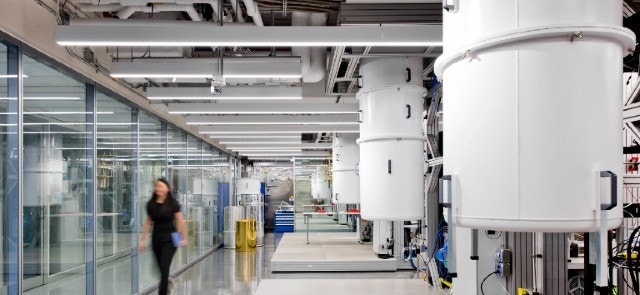The lithium atom is one of the lightest atoms on the periodic table. Its properties make it ripe for generating energy in combination with other elements. This blend of light weight and big energy potential is the key to its starring role in most 21st-century battery chemistry.
Now consider today’s electric vehicles, powered by lithium-ion cells that have been improved, incrementally, for decades. But the lithium-ion batteries in any electric vehicle are still the heaviest part of the car. All that extra weight limits the potential of vehicle performance. By contrast, the promise of lithium-oxygen batteries, on paper, isn’t incremental at all. It’s a leap in how much energy a battery could produce versus how much it weighs. In theory, lithium-oxygen could be used for a more lightweight battery that can go much further with a single charge.
Increased energy density
Today’s lithium-ion batteries have 3 times the specific energy density of earlier lead-acid cells
Multiplied energy density
Lighter weight lithium-oxygen batteries potentially have 5–15 times the specific energy density of today’s lithium-ion cells
For the chemical industry, turning that theory into a marketable product could create a thriving profit center for decades to come—with applications to everything from mobile devices to cars to unimagined new forms of transportation. That’s one reason why Jamie Garcia, Senior Manager of Quantum Algorithms, Applications and Theory at IBM and her team of quantum chemists have been spending a lot of time on video conferences with research colleagues at Mitsubishi Chemical in Japan.
The IBM Quantum team was approached by Qi Gao at Mitsubishi Chemical and Professor Naoki Yamamoto at Keio University to model and study the complex mechanism for lithium superoxide rearrangement, a key chemical step in lithium-oxygen batteries. Their collaboration lays the groundwork for simulating—and eventually, investigating a problem connected to a real-world application on a quantum computer.
This is a task that’s impossible to do efficiently even on today’s most powerful supercomputers. For Mitsubishi Chemical’s R&D team, modeling such a complex electrochemical reaction on a classical computer has proven to be incredibly difficult. By collaborating with the IBM and IBM Q Hub at Keio University teams, Mitsubishi Chemical is exploring how to use quantum computers to create accurate simulations of what’s happening inside a chemical reaction at a molecular level.
Most chemists who’ve done traditional benchwork understand that hours, months, and even years can be devoted to trying to understand how the chemistry is occurring inside the flask, and being able to control it. Quantum computing promises to accelerate all that.
Mitsubishi Chemical sees the value in that promise. A world leader in synthesizing innovative materials, it serves dozens of industries—automotive, aerospace, medical, energy production, transportation infrastructure, building and construction—all in need of much better tools to solve pressing challenges.
Serving the diverse needs of many industries means Mitsubishi Chemical, by definition, does extensive research and development work. Like many other members of the IBM Quantum Network, it has budgets devoted toward molecular simulation, and is investing in ways that quantum computing can help. At the enterprise level, that can lead to transcontinental collaborations—in this case, among cross-disciplinary research teams at Mitsubishi Chemical, Keio University in Tokyo, and IBM.
“If you look at the biggest unsolved problems in the world, they’re challenges that have been around for decades,” says Jamie Garcia, Senior Manager of Quantum Algorithms, Applications and Theory at IBM. “That’s because we’ve been hammering with the same tools—but we’re reaching a plateau with what we can actually accomplish. The promise of quantum computing brings something new to the table. At the end of the day, that’s what’s going to transform industries, disrupt industries. A new tool.”
The research triumvirate of Mitsubishi Chemical, Keio University, and IBM Quantum is working to better understand lithium-oxygen’s potential as an energy source by using new algorithms that take advantage of quantum computing.
Running a new breed of algorithms, within quantum’s completely new hardware environment and software, has already yielded quantitatively correct computational results of complicated chemical reaction in the discharge process of lithium-oxygen battery. Furthermore, by looking at molecular fundamentals through a new lens, researchers are also trying to mine new insights, and observe phenomena that are not generally accepted as known or expected.
“By exploring specific parts of these reactions with quantum computers, in such closer detail and depth, you get these little a-ha moments,” says IBM’s Jamie Garcia. “So there are a lot of reasons why using these quantum systems for chemistry makes a lot of sense. There’s always something new to be found, and a next question to answer.”
Mitsubishi Chemical's (link resides outside ibm.com) mission is to create innovative solutions globally based on our core values of Sustainability, Health and Comfort, striving for the well-being of people, society and our planet Earth.
IBM Quantum Network is a community of Fortune 500 companies, academic institutions, startups and national research labs working with IBM to advance quantum computing.
Legal
© Copyright IBM Corporation 2020. IBM Corporation, New Orchard Road, Armonk, NY 10504
Produced in the United States of America, March 2020.
IBM, the IBM logo, and ibm.com are trademarks of International Business Machines Corp., registered in many jurisdictions worldwide. Other product and service names might be trademarks of IBM or other companies. A current list of IBM trademarks is available on the web at “Copyright and trademark information” at ibm.com/trademark.
This document is current as of the initial date of publication and may be changed by IBM at any time. Not all offerings are available in every country in which IBM operates.
The performance data and client examples cited are presented for illustrative purposes only. Actual performance results may vary depending on specific configurations and operating conditions. THE INFORMATION IN THIS DOCUMENT IS PROVIDED “AS IS” WITHOUT ANY WARRANTY, EXPRESS OR IMPLIED, INCLUDING WITHOUT ANY WARRANTIES OF MERCHANTABILITY, FITNESS FOR A PARTICULAR PURPOSE AND ANY WARRANTY OR CONDITION OF NON-INFRINGEMENT. IBM products are warranted according to the terms and conditions of the agreements under which they are provided.



